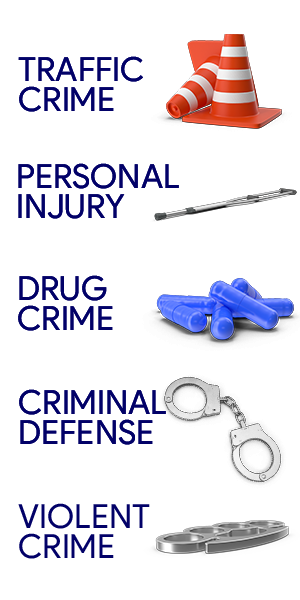Attorney Handling FedEx Truck & UPS Truck Accidents in Riverview and Surrounding Areas
Riverview FedEx & UPS Accident Lawyer Large companies like FedEx and UPS invest substantial resources into protecting themselves from litigation in accidents. If you were injured in an accident caused by a FedEx or UPS driver, you need an experienced Riverview FedEx & UPS Accident Lawyer who has litigated trucking accidents and is ready for the complexities of taking on a large company.
Drivers, despite their professional training, can still make mistakes that result in accidents. Drivers for UPS and FedEx are under pressure to meet on-time delivery expectations. The pressure to get things done quickly can increase the risk of an accident caused by a delivery truck.
Federal Motor Carrier Rules that Govern FedEx & UPS
The Federal Motor Carrier Safety Administration (FMCSA) regulates the operation of commercial vehicles in interstate commerce. According to the FMCSA, a vehicle is considered a commercial vehicle if:
- It weighs 10,001 lbs. or more
- The vehicle is designed to transport between 9-15 passengers for compensation
- A vehicle designed to transport 15 or more passengers and not used for compensation
- Any vehicle used to transport materials that are hazardous under the Hazardous Materials Transportation Act (49 USC 5101 et seq.)
Vehicles that meet any of the above criteria must comply with the United States Department of Transportation (DOT) safety regulations, including, but not limited to:
- Testing for controlled substances and alcohol for all persons required to possess a CDL license
- Driver qualifications, including an annual medical exam
- Hours of service regulations limiting the hours a commercial vehicle driver can be on the road in a continuous period
- Inspection, repair, and maintenance of the vehicle
Both UPS and FedEx have vehicles that meet the definition of commercial vehicles involved in interstate commerce and are, therefore, subject to the rules set forth by the FMCSA.
The Differences Between UPS and FedEx
FedEx and UPS have much in common, such as providing air and ground service and the ability to ship everything from a letter to thousands of pounds of freight. However, the differences between the two companies matter most if you are involved in an accident with either carrier.
The significant difference that can impact your accident claim is that FedEx says that they utilize independent contractors in some company divisions. Independent contractors supposedly have substantial decision-making power in how the vehicles are maintained. Independent contractors also have latitude in keeping an ongoing check of each driver’s driving record.
FedEx Ground and FedEx Home say that they use independent contractors, while FedEx Express uses direct employees. However, under Florida law, if a company controls the time, manner, and scope of a driver’s work, it can be liable for accidents caused by the driver’s negligence. Therefore, whether it is an independent contractor or FedEx direct employee, FedEx remains responsible for the driver’s actions.
FedEx Express conducts a full background check when a new employee is hired and performs at least annual checks of a driver’s background. Their fleet undergoes visual inspection at the start of each shift, and there is a comprehensive system for reporting mechanical and maintenance issues.
UPS uses employees for all of its services, clarifying the way an accident is handled. There is substantial legal precedent for holding an employer liable for an employee’s actions while on the job. UPS closely monitors the driving record of all of its drivers and has a system to ensure the mechanical soundness and safety of its vehicles.
Fleet Size and Type
UPS is based in Atlanta, Georgia. Its fleet has approximately 126,000 vehicles, including:
- Tractor-trailers
- Cargo vans
- Package cars
- Motorcycles
- Bicycles
FedEx, based in Memphis, Tennessee, has 43,000 motorized vehicles in its fleet. The overall fleet size varies as FedEx uses leased vehicles in some divisions. The vehicles owned and operated by FedEx include:
- Tractor-trailers
- Electric cargo vans
- Cargo vans diesel/gas
- Rental vehicles during times of high volume
The type of vehicle involved in an accident will play a role in the rules and regulations that govern the vehicle and the driver’s responsibilities. UPS requires its tractor-trailer and freight drivers to have a CDL, while a CDL is not required for other delivery drivers.
FedEx has different requirements for its independent contractors. The requirement for a CDL will depend on the type of delivery vehicle being operated.
Other Factors that Complicate UPS and FedEx Accidents
Establishing liability is the primary factor in accidents involving UPS and FedEx vehicles. However, commercial vehicle claims are complicated in ways that Florida car accident cases are not. Commercial vehicles are subject to different rules and regulations for operation. An experienced attorney is crucial in helping an injured party receive the compensation they deserve.
Commercial vehicles are required to have a “black box,” which stores a substantial amount of data that can help establish the cause of the accident and who was at fault. Getting access to the black box data on commercial cargo carriers can be a complicated legal process.
If the accident was caused by a UPS or FedEx employee, juries are more willing to award plaintiffs compensation. Juries are notoriously more likely to award damages if the defendant is a large company instead of an independent driver. Commercial carriers such as FedEx and UPS realize this and fight hard to prevent a case from moving to trial. They will attempt to assign blame to the plaintiff, hoping to reduce their liability in a personal injury case.
Liability Insurance Carried by FedEx & UPS
FedEx and UPS each carry liability insurance on their vehicles, and the insurance limits may vary by state and carrier. The policies carry large limits, usually in excess of one million dollars. More often than not, the insurance has “layers” which means that the first layer may be one million, the second layer is five million, and the third layer is ten million. It depends on the carrier, the case, and the truck.
Driver




